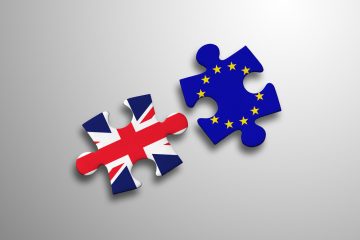
In Polls We Do Not Trust: The British Polling Experience
On 18th April 2017 Theresa May announced a snap general election to take place on 8th June. The announcement came as a surprise and was widely believed to be motivated by the large lead in the polls (approximately twenty points) that Ms May holds over her main rival, Labour Party leader Jeremy Corbyn. In calling the snap election at this point, Theresa May has put a lot of confidence in her projected lead in the polls. This is interesting because British election polls have previously been met with a large degree of skepticism and distrust. In this blogpost, I briefly explore the British polling experience and highlight the various explanations that have been provided for the UK’s poor track record …

What Brexit means for Britain’s future, according to Oxford University’s Chancellor
As Britain formally triggers the doleful negotiations to exclude itself from the mainstream of European politics and economics, Prime Minister Theresa May refuses to use the word “divorce” to describe what is happening. My wife, a retired family lawyer and mediator, thinks May could be correct. After all, the family house we are exiting still contains much of our history and family silver, as well as our future economic interest. In that sense, divorce is scarcely an option. Britain has not been as insular an island as some people take it to be. From our reigning royal family (which is German) to our exports (overwhelmingly to Europe), we have helped to shape and in our turn been shaped by developments …

Podcast: Trump’s first 100 days
An analysis of the policy implementation of Donald Trump’s campaign promises in his first 100 days as President of the United States of America. Hailing from New York, Gabriel Delaney studies Politics at Oxford University and has experience as a presidential election field organiser in Pennsylvania for the 2012 Obama campaign. As well as critiquing Trump’s presidency, Gabriel is very good at explaining some of the mechanics of the U.S. political system. This podcast was created and first published by the Wide Open Air Exchange.

Estimating the Effect of Feature Selection in Computational Text Analysis
Below, I discuss and analyse pre-processing decisions in relation to an often-used application of text analysis: scaling. Here, I’ll be using a new tool, called preText (for R statistical software), to investigate the potential effect of different pre-processing options on our estimates. Replication material for this post may be found on my GitHub page. Feature Selection and Scaling Scaling algorithms rely on the bag-of-words (BoW) assumption, i.e. the idea that we can reduce text to individual words and sample them independently from a “bag” and still get some meaningful insights from the relative distribution of words across a corpus. For the demonstration below, I’ll be using the same selection of campaign speeches from one of my earlier blog posts, in which I used a …

Complex Negotiations are Dynamic and Unpredictable: An analysis of Sturgeon’s and May’s approach to Brexit
In the week of 13 March, two momentous events took place. Parliament passed the bill giving the government authority to notify the European Council that the United Kingdom intends to withdraw from the European Union. And First Minister Nicola Sturgeon announced that her government will introduce legislation for a second independence referendum for Scotland. The first occurred despite the House of Lords’ insistence on a prior guarantee of the status of EU citizens or of an up-or-down vote on the final deal (or no deal); the second was a surprise move, seemingly calculated to pre-empt a positive news cycle on the day the bill was approved. These two leaders’ approaches to Brexit so far show the difference between imposing order and control in an …

In a democracy, no decision should ever be irreversible
The British parliamentary system, inspired by John Locke, Edmund Burke, John Stuart Mill and many others who believed in a system of checks and balances to guarantee our liberties, has in the past been much admired as a model of liberal democracy, one that has enabled the peaceful evolution that has been an almost unique part of our history. Today it has been superseded. The doctrine of Jean-Jacques Rousseau, that the will of the people must always prevail, much admired by autocrats ever since the days of Robespierre and the Committee of Public Safety, now prevails in Westminster instead. Speaker after speaker in the House of Commons debates on Article 50 declared that, although he or she voted Remain and …

“It’s the economy stupid”: Declining labour mobility explains Trump’s victory
Donald Trump’s success in the US elections came as a surprise to both pollsters and political pundits. And since November, both have peddled numerous theories to explain their mistakes. Yet, one aspect of his electoral victory remains underappreciated: labour mobility. Labour mobility across regions is much higher in the United States compared to many other countries in the world, including the European Union members, allocating individuals into the jobs where they are the most productive. As such, mobility is an important factor for upward social mobility for middle class Americans, where they can increase their earnings and their life standards by moving to higher-earning jobs in dynamic regions. [1] But economic mobility has been declining over the last two decades.[2] …

The will of the people: A primer in direct democracy
of the United Kingdom of Great Britain and Northern Ireland, having been given sovereignty over whether the Kingdom leaves or remains in the European Union insist, in the interest of democracy and unity, on being given the opportunity to take an informed decision on the final outcome of the Art. 50 negotiations, as approved by parliament, through a referendum to either accept this outcome or to remain in the European Union. THE REFERENDUM PREDICAMENT A lot has been made in the press and in the recent parliamentary debates about the moral obligation for members of parliament to respect “the will of the people” as expressed in the narrow victory for leaving the European Union in the Brexit referendum of last …









